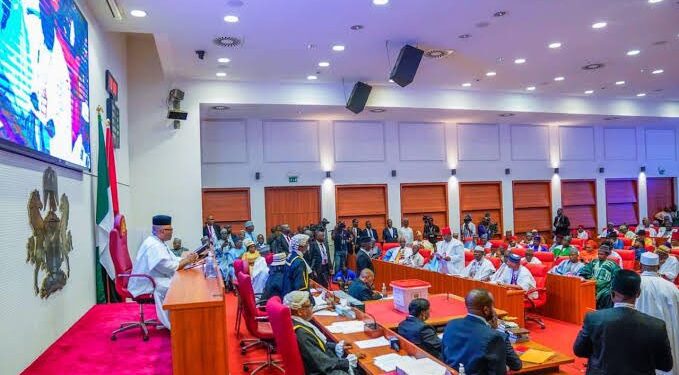The Nigerian Senate has approved President Bola Tinubu’s external borrowing proposal of over $21 billion for the 2025–2026 fiscal period, marking a significant step toward funding the 2025 Appropriation Act and supporting key infrastructure and development initiatives across the country.
The comprehensive loan package comprises $21.19 billion in direct foreign borrowing, €4 billion, ¥15 billion, and an additional $65 million in grants. Also included is a plan to raise approximately ₦757 billion through domestic bonds, along with provisions to secure up to $2 billion from a foreign-currency-denominated instrument issued locally.
The decision followed the presentation of a report by the Senate Committee on Local and Foreign Debt, chaired by Senator Aliyu Wamako. According to him, the request—originally submitted in late May—was delayed by a combination of legislative recess and documentation challenges from the Debt Management Office (DMO).
Senator Olamilekan Adeola, who heads the Appropriations Committee, confirmed that the loans had already been incorporated into the 2025 budget and the Medium-Term Expenditure Framework (MTEF).
“With this approval, we now have all financing streams—revenue and debt—aligned to fully implement the 2025 budget,” he said.
Senators in support of the plan defended it as consistent with global financing practices. Senator Sani Musa emphasized that the borrowing will be disbursed over a six-year period and is necessary for national growth.
“No modern economy develops without structured borrowing. This is part of responsible economic management,” Musa explained.
Backing the approval, Senator Adetokunbo Abiru, Chair of the Banking, Insurance, and Other Financial Institutions Committee, noted that the loans are mostly concessional with extended repayment periods of up to 35 years, compliant with the Fiscal Responsibility Act and Debt Management Act.
He added that the funds are earmarked for capital and human development projects, spanning infrastructure, power, agriculture, security, housing, and digital connectivity.
One standout project is the allocation of $3 billion for the rehabilitation of the Eastern Rail Corridor from Port Harcourt to Maiduguri. Senator Victor Umeh of Anambra Central praised the investment as a historic commitment to regional connectivity and development.
“This is the first time such significant funding is going to the eastern railway line. It’s a game-changer,” Umeh said.
Despite wide support, some lawmakers expressed reservations. Senator Abdul Ningi (Bauchi Central) called for increased transparency and accountability, urging lawmakers to communicate the specifics of the loans to their constituents.
“Nigerians deserve to know exactly how much is being borrowed in their name and what these funds are meant to achieve,” Ningi stated.
Deputy Senate President Jibrin Barau commended the legislative committees for their diligence, noting that the borrowing strategy was designed to ensure national inclusion and balanced development.
“This reflects the vision of the Renewed Hope Agenda. Every region is considered,” Barau added.
The Senate reiterated that all borrowed funds must be channeled strictly toward capital projects in accordance with public financial laws and oversight mechanisms.




